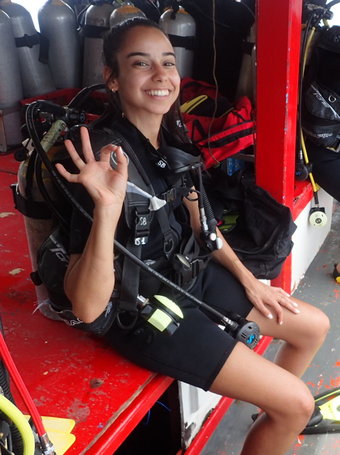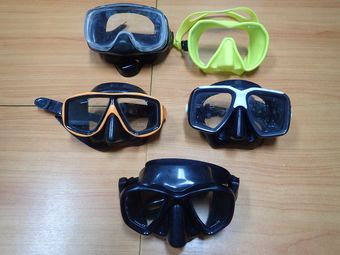- Home
- News
A friendly and attentive Divecenter Scuba Birds organizes amazing daily diving trips on Koh Tao and Koh Samui.
I’ll describe just one I have been participated, together with five wonderful fundivers with PADI Advanced Open Water level. First dive we did at Japanese Garden, probably the most visited divesite of Koh Tao. At a depth of ~15 meters near concrete blocks used for divers buoyancy training, we met a shoal of curious young Batfish. They let us come very close, so we had a possibility to take few nice pictures. Two small Slender Suckerfish follow us for almost 20 minutes, trying to attach to our tanks, then chasing each. A small hawksbill turtle passed by slowly.
For our second dive we did
It was a good day! And tomorrow promises to be even better! We’ll go to the most stunning Koh Tao divesite, Chumphon Pinnacle with a hope to meet the biggest fish in the world — Whaleshark. Wish us good luck in our new adventures and amazing discoveries!
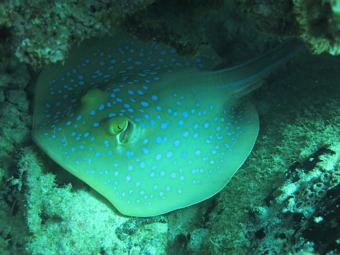
For scuba diving on Koh Samui our own dive boat visits the most «lucky» dive sites for Whaleshark encounter.
Between them is our favorite dive site Chumphon Pinnacle, also Southwest Pinnacle, Sail Rock and Shark Island. Occasionally Whalesharks are spotted at dive sites such as Green Rock and White Rock that we often use for open water training dives.
You need to be a certified PADI Open Water Diver at a minimum to dive the sites Whalesharks visit more often. Being an Advanced Diver gives you better flexibility of depth as you can dive to 30 m that enables you to fully enjoy the more famous dive sites.
Very often Whaleshark prefers to stay close to the surface, so you can even snorkel with it!
Such a close encounter with these graceful creatures leaves a lot of positive emotions and good memories about diving in Koh Tao and Ko Samui!
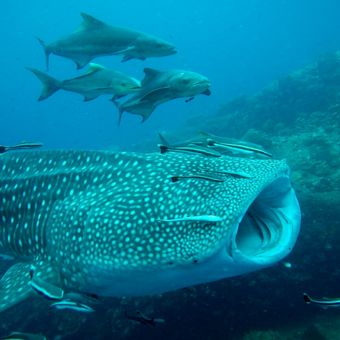
In our diving school Scuba Birds on Koh Tao and Samui Islands we provide Open Water Diver courses along many others, after which each student would be able to use a surface marker and learn their differences to apply in many different environments when diving.
SMB is deployed from the depth of at least 5 meters and allows you to perform a safety stop, or when in shallow waters and upon surfacing.
Divers or freedivers use dive flags on the surface to allow safe environment to conduct the dive or training, by doing this they are communicating with boats to avoid the area.
One of the few important safety features in the BCD is a whistle, it allows the diver to attract attention on the surface in case of the emergency to the nearby boats.
Small portable diving light that attaches to your BCD often seen on the night dives, allows diving buddies to stay close or within vision to each other and helps to locate you on the surface from the boat.
Few of the surface and signaling markers discussed above are the key to keep you and your team safe during the dive in Thailand, they will help to minimize the potential problems and stress. Our Boat Captains in the area are well trained and knowledgeable, they pay a lot of attention to the safety of divers and keep following the highest standards.
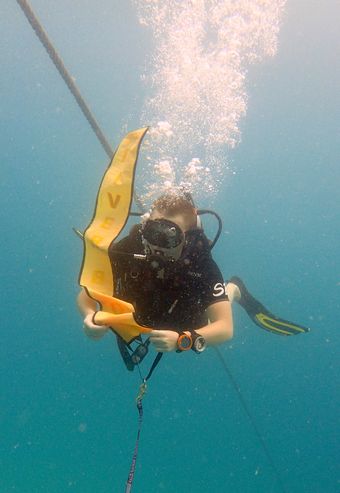
In our course Open Water Diver in Koh Tao we touch the subject of fitting the gear so that you can focus on the diving itself.
Even though the mask could fit, theres still a chance for water to enter through different parts of the mask that depends on the right fit. Our PADI Instructors help to teach students how to clean the mask safely without ascending to the surface and instead continue the dive plan. The skills to help clearing the mask are easy to perform. Imagine the scenario, the mask provided to you does not fit right and often fills with salty water, or fogs and even puts pressure to your nose. Which model to choose from?
Diving masks are designs that the silicone rubber is thin and flexible, which allows the fit to be more adjusted to your personal preference with time. Place the mask on your face without the strap and breath in with your nose, mask should be in place even with some light head movements. If you feel discomfort or mask cannot stay in place try a different model until you can find the right fit. Today many different companies bring a variety of items to help you find the right one for you, with your favorite color, size and shape.
During our Discover Scuba Diving course with Scuba Birds on Koh Tao and Samui our instructors bring a few different models and shapes for each new student to find the right fit and to make diving in Thailand for our guests enjoyable and safe.
If you want to extend your diving time while diving deeper on Koh Tao and Ko Samui, just sign up for your PADI Enriched Air Diver course with Dive Center Scuba Birds on Koh Tao and Koh Samui!
This is due to the increased content of O2 in the air giving you longer no decompression times, especially so on repetitive dives (like on Liveaboard in Similan Islands, when you can do up to four dives during a day).
You can complete your PADI Specialty course Enriched Air in our Dive Center Scuba Birds in Koh Tao and Koh Samui.
Completing PADI Specialty course Enriched Air with Dive Center Scuba Birds in Koh Tao and Koh Samui provides you good opportunity to get a new experience and develop your theoretical knowledge. During the course you will learn:
— how to use O2 analyzer and to analyze the O2 content in your tank (because this is your safety and your responsibility as a diver to analyze your gases!),
— set your dive computer for Enriched Air,
— managing your O2 exposure,
— plan, organize and conduct no decompression dives on Enriched Air to a maximum depth of 40 meters.
Your PADI Enriched Air Diver certification can be credited as one of the five PADI Specialties required to attain the highest
